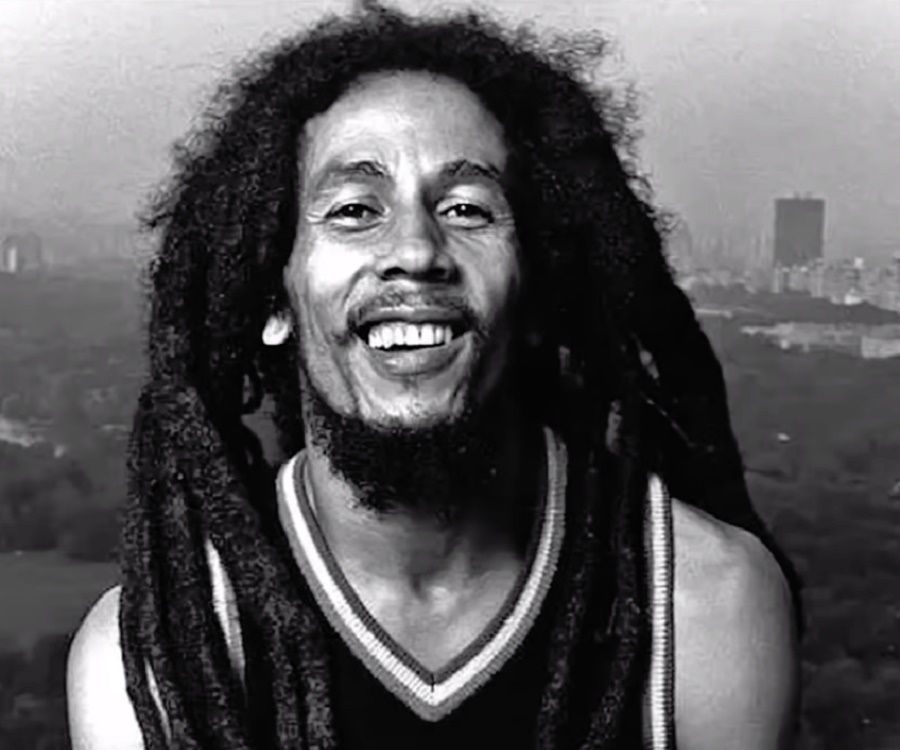
Who is Bob Marley?
Few musicians have had the type of eternal impact of Bob Marley. The Jamaican reggae star remains a household name four decades after his death. His music is still as immediately recognizable as that of Mozart or The Beatles, his dreadlocked silhouette as identifiable as that of Michael Jackson or Einstein.
Bob Marley touched the world in a way that extended beyond music. His injection of love, peace, and lifestyle into the global zeitgeist continues to shape people’s journeys today. His raspy tenor continues to shape countless musicians’ musical stylings. And his support for cannabis no doubt has played a key role in the long road toward accepting what he saw as a sacred plant.
Below, we get to know the man, his music, and his legacy a bit better.
1. Bob Marley’s Presence
Some people just have stage presence. It’s hard to quantify it — they simply step into view and the audience is rapt with attention.
Frank Zappa had it. Prince had it. Bob Marley had it.
Bob Marley wasn’t particularly tall at 5 ft. 7 in., and there wasn’t much of him to take up the stage at just over 140 lbs. But when he stepped onto a stage, something in his body language, demeanor, and gait made the crowd forget their conversations and pay attention.
2. His Diet
Marley’s diet was heavily tied to Rastafarian and Jamaican traditions. When he married his wife Rita, they grew staples like scallions, bok choy, pimentos, callaloo, thyme, and breadfruit. They also grew the Jamaican fruit ackee, which only becomes edible when it properly ripens and splits open, at which point its meat can be sautéed and combined with onion, saltfish, and bacon.
Fame did not sway Marley from the food he most loved: that of his homeland. Specifically, he stuck as close as possible to the “ital” tradition. The word itself comes from “vital” and is a mandatory part of Rastafari’s Nyabinghi Mansion — essentially, it stresses a plant-based diet of natural food grown from the earth.
To him, staying true to his roots took such precedence that he even brought his own personal chef along on tour. Named Gilly, this chef prepared delicious meals that used ital scripture as its basis but allowed consumption of fish and meat. Pork, however, was never on the menu, nor was salt. Gilly used fresh herbs and spices to season his dishes instead.
Coming off stage, Bob and his crew were treated to an aromatic backstage feast with rice, fried plantains, coconut milk-simmered kidney beans, and ital stew. All of this food was seasoned with the delightful tang of fresh-squeezed citrus and served with all manner of nonalcoholic drinks (Marley didn’t drink alcohol).
One of his favorite drinks was Irish Moss, which is a thick, aphrodisiacal drink made from seaweed and condensed milk and flavored heavily with cinnamon.
3. Bob Marley Was A Sports Lover
If there’s one thing Bob Marley loved outside of music, it was soccer.
Look at a few pictures of Bob Marley and it’s hard to miss the soccer ball that seems present as often as his guitar. In fact, he hired one of Jamaica’s most beloved players, Alan “Skill” Cole, as his tour manager throughout the 1970s.
Marley often gave his interviews while playing soccer with the interviewer, as he felt this was the most genuine way for strangers to get to know him. Soccer served as his comfort, his return to the happy, calm place inside him.
So then there’s the obvious question: Was he any good?
No — he was excellent. Carl Brown, one of the island nation’s most prominent soccer players, said that Bob would often play for seven hours a day, starting around 8 a.m. and finishing in the afternoon. It was Brown who eventually helped Marley fulfill one of his ultimate dreams: He let the singer play in Kingston’s National Stadium during a game.
Brown says he never saw Bob Marley happier than in that moment.
4. Music Journey
Bob Marley’s music career started at age 16. Having grown up in the poor section of Trenchtown, Jamaica, he found inspiration in American musicians such as The Drifters and Sam Cooke.
His first band was called The Wailers and included fellow young musicians Bunny Livingston and Peter Tosh. The band started in 1963 and set out to celebrate the relatively new religion of Rastafarianism (which by then was around 30 years old). Though young, Marley’s music gave hope to poor and underserved Jamaicans who saw few prospects for bettering their situation.
Their lyrics spoke of peace, brotherhood, freedom, equality, and justice — all themes he carried through his career. The style of their music started as “rude boy music.” Rude boys, or mischievous youths who listened to ska and rocksteady music, were a much fretted-over component of Jamaican society during the 60s and were known for crashing dancehall events. The Wailers soon slowed down the tempo and settled on reggae.
In 1973, a whopping 11 years into their career playing together, Island Records finally recorded and released the band’s debut album Catch a Fire. Its single “Stir It Up” achieved international fame. The band began touring internationally and released many different hits — some of which were aided by others covering them. Eric Clapton covered his song “I Shot the Sheriff,” which promptly elevated Marley to superstardom in the USA. He went on to sell more than 20 million albums during his lifetime.
5. An Ambassador Of Peace
Bob Marley is considered one of the greatest ambassadors for peace in history. His message of peaceful rebellion, coupled with his advocacy for ganja and his focus on hope and love, came across in his music and in his persona.
Bob Marley was among the first international superstars not born in high-income countries like the USA and Great Britain. As a person of color spreading positivity and hope across racial, cultural, and economic lines, he inspired untold millions. Despite his death from cancer at age 36, his legacy lives on in nearly every part of our culture: our music, our politics, our clothing, our ganja, and our hopes for society.






